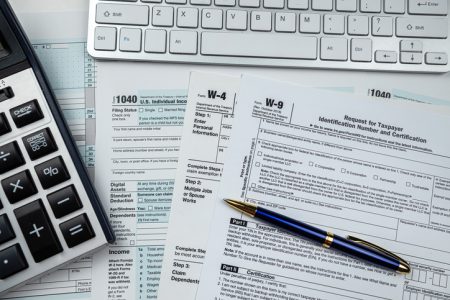The federal corporate income tax rate in the U.S. is a flat 21% as of 2025. This rate applies to corporate profits and affects how much income a company keeps after taxes. In addition to the federal rate, businesses may also face state corporate taxes, which vary by state and increase the total tax cost.
A financial advisor can help assess the combined effect of federal and state taxes, and recommend strategies to manage tax liabilities.
Understanding the Federal Corporate Income Tax Rate
The federal corporate income tax rate influences a company’s bottom line and its ability to reinvest in growth. A lower tax rate means businesses can retain more of their earnings, which they can then use for expansion, research and development or increased employee wages. A higher tax rate, on the other hand, could limit these opportunities, potentially affecting a company’s competitive edge. For small businesses, the impact can be even more pronounced, as they often have fewer resources to absorb tax liabilities.
As of 2025, the federal corporate income tax rate stands at a flat 21%. The top rate of 35% was reduced in 2017 with the Tax Cuts and Jobs Act (TCJA). The U.S. federal corporate income tax rate is competitive on a global scale, especially after the 2017 tax reform.
Many countries have corporate tax rates that are either similar to or higher than that of the U.S. This makes America a potentially attractive location for multinational corporations. However, some countries offer lower rates or special tax incentives to attract foreign investment. Businesses operating internationally must weigh these differences when planning their global tax strategy, as they can significantly impact tax obligations.
Potential Deductions on the Federal Corporate Income Tax
Federal corporate income tax deductions play a crucial role in reducing the taxable income of businesses, ultimately lowering their tax liability. These deductions are specific expenses that the Internal Revenue Service (IRS) allows companies to subtract from their total income, thereby decreasing the amount of income subject to taxation.
One of the most common types of deductions available to corporations includes ordinary and necessary business expenses. These are costs that are essential for the operation of the business, such as salaries, rent, utilities and office supplies. The IRS requires that these expenses be both ordinary, meaning common and accepted in the business’s industry, and necessary, meaning helpful and appropriate for the business.
Depreciation and amortization are other significant deductions that corporations can leverage. Depreciation allows businesses to deduct the cost of tangible assets, like machinery and vehicles, over their useful lives. Amortization, on the other hand, applies to intangible assets like patents and trademarks. These deductions help businesses recover the costs of their investments over time, aligning expenses with the revenue generated by these assets.
Interest paid on business loans is another deductible expense that can reduce a corporation’s taxable income. This includes interest on loans taken out for business operations, expansions or purchasing equipment. However, there are limitations and specific conditions under which interest can be deducted. As such, businesses need to maintain accurate records and may benefit from consulting a financial advisor to maintain compliance.
Tips for Reducing Income Tax Liability for Your Corporation
Here are four common ways corporations reduce tax liability:
- Use tax credits and deductions: Tax credits and deductions help reduce taxable income. Options like the research and development (R&D) tax credit or deductions for energy-efficient equipment support business spending on innovation and upgrades.
- Consider tax-deferred retirement plans: Contributing to tax-deferred retirement plans like a 401(k) can reduce a corporation’s taxable income. Contributions are often tax-deductible, providing immediate tax savings while also benefiting employees.
- Optimize depreciation methods: Accelerated depreciation methods, such as the modified accelerated cost recovery system (MACRS), allow businesses to write off asset costs more quickly. This can lead to tax savings in the early years of asset ownership, improve cash flow and reinvestment in your business.
- Leverage loss carryforwards: A corporation that has experienced losses in previous years, may be able to carry losses forward to offset future taxable income. This strategy can reduce tax liability in profitable years and provide a buffer during economic fluctuations.
Bottom Line

The federal corporate income tax rate in the U.S. is a flat 21%, which gives businesses a clear starting point for planning. This rate can affect decisions about investing, expanding, or hiring. However, state corporate tax rates are not the same across the country and can change the total tax that a company pays. Businesses also need to factor in deductions, credits and any international tax rules that may affect their overall tax rate.
Tax Planning Tips
- A financial advisor can help a business manage corporate income tax by identifying applicable deductions, credits and strategies to reduce the overall tax burden. Finding a financial advisor doesn’t have to be hard. SmartAsset’s free tool matches you with vetted financial advisors who serve your area, and you can have a free introductory call with your advisor matches to decide which one you feel is right for you. If you’re ready to find an advisor who can help you achieve your financial goals, get started now.
- One common business tax strategy is to accelerate deductible expenses into the current tax year to reduce taxable income. Examples include prepaying rent or buying necessary equipment before year-end. Here are seven tax-planning strategies, including income and expense timing, for your business.
Photo credit: ©iStock.com/filadendron, ©iStock.com/
Read the full article here









